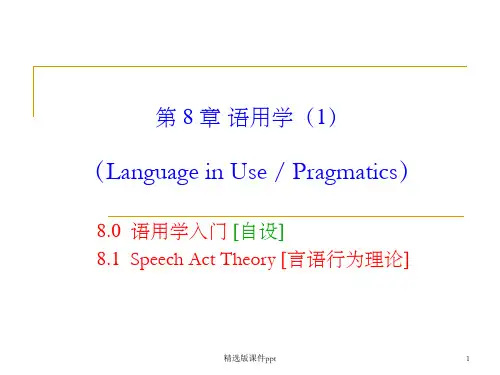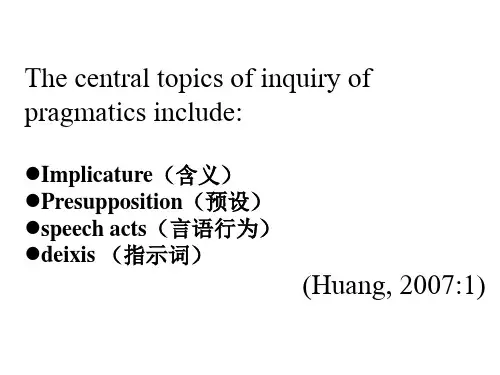《语言学教程》第 8 章 语用学.ppt
- 格式:ppt
- 大小:743.55 KB
- 文档页数:75
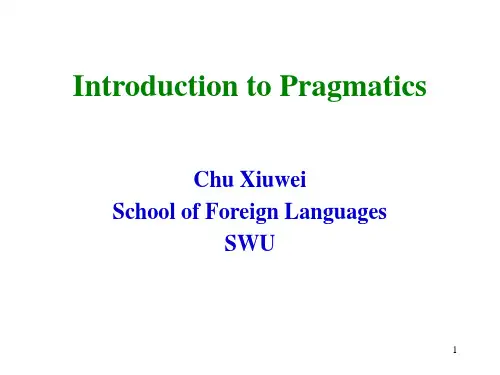
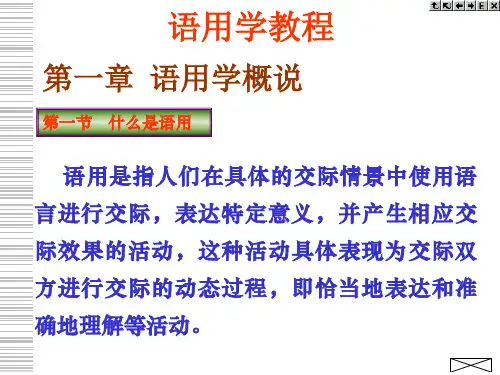
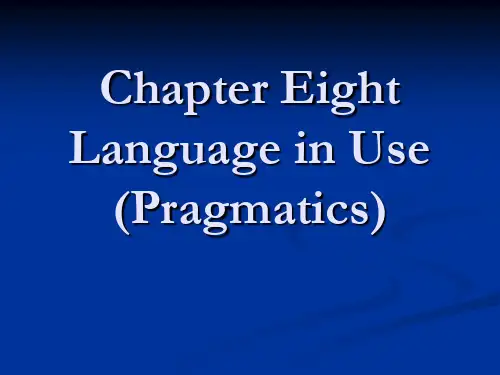
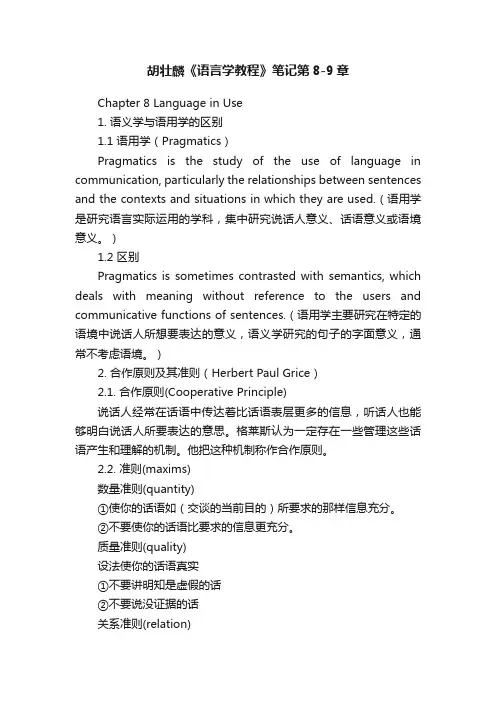
胡壮麟《语言学教程》笔记第8-9章Chapter 8 Language in Use1. 语义学与语用学的区别1.1 语用学(Pragmatics)Pragmatics is the study of the use of language in communication, particularly the relationships between sentences and the contexts and situations in which they are used.(语用学是研究语言实际运用的学科,集中研究说话人意义、话语意义或语境意义。
)1.2 区别Pragmatics is sometimes contrasted with semantics, which deals with meaning without reference to the users and communicative functions of sentences.(语用学主要研究在特定的语境中说话人所想要表达的意义,语义学研究的句子的字面意义,通常不考虑语境。
)2. 合作原则及其准则(Herbert Paul Grice)2.1. 合作原则(Cooperative Principle)说话人经常在话语中传达着比话语表层更多的信息,听话人也能够明白说话人所要表达的意思。
格莱斯认为一定存在一些管理这些话语产生和理解的机制。
他把这种机制称作合作原则。
2.2. 准则(maxims)数量准则(quantity)①使你的话语如(交谈的当前目的)所要求的那样信息充分。
②不要使你的话语比要求的信息更充分。
质量准则(quality)设法使你的话语真实①不要讲明知是虚假的话②不要说没证据的话关系准则(relation)所谈内容要密切相关方式准则(manner)要清晰。
①避免含糊不清②避免歧义③要简练(避免冗长)④要有序3. 言语行为理论(Speech Act Theory)---John Austin3.1. 施为句&叙事句(Performatives & Constatives)施为句是用来做事的,既不陈述事实,也不描述情况,且不能验证真假;叙事句要么用于陈述,要么用于验证,可以验证真假。
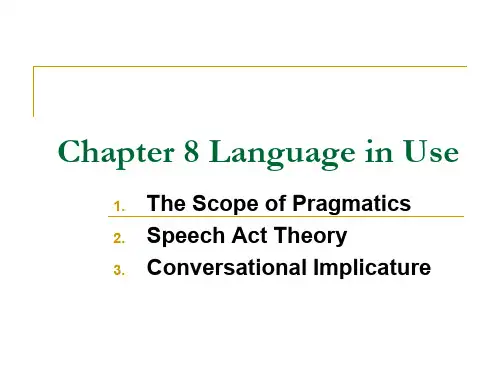
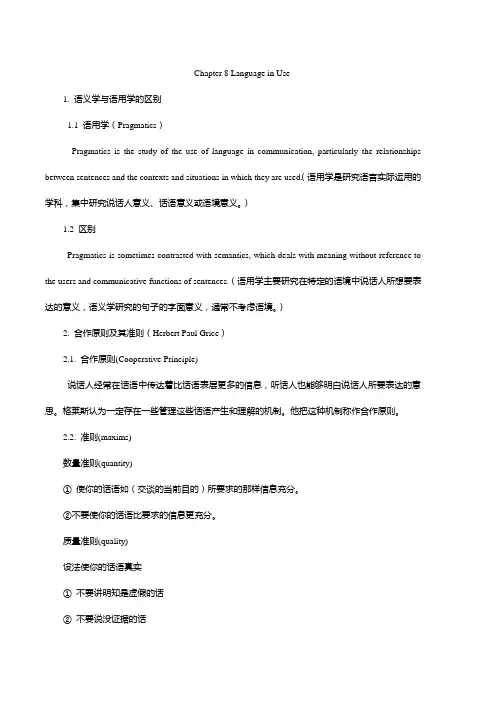
Chapter 8 Language in Use1. 语义学与语用学的区别1.1 语用学(Pragmatics)Pragmatics is the study of the use of language in communication, particularly the relationships between sentences and the contexts and situations in which they are used.(语用学是研究语言实际运用的学科,集中研究说话人意义、话语意义或语境意义。
)1.2 区别Pragmatics is sometimes contrasted with semantics, which deals with meaning without reference to the users and communicative functions of sentences.(语用学主要研究在特定的语境中说话人所想要表达的意义,语义学研究的句子的字面意义,通常不考虑语境。
)2. 合作原则及其准则(Herbert Paul Grice)2.1. 合作原则(Cooperative Principle)说话人经常在话语中传达着比话语表层更多的信息,听话人也能够明白说话人所要表达的意思。
格莱斯认为一定存在一些管理这些话语产生和理解的机制。
他把这种机制称作合作原则。
2.2. 准则(maxims)数量准则(quantity)①使你的话语如(交谈的当前目的)所要求的那样信息充分。
②不要使你的话语比要求的信息更充分。
质量准则(quality)设法使你的话语真实①不要讲明知是虚假的话②不要说没证据的话关系准则(relation)所谈内容要密切相关方式准则(manner)要清晰。
①避免含糊不清②避免歧义③要简练(避免冗长)④要有序3. 言语行为理论(Speech Act Theory)---John Austin3.1. 施为句&叙事句(Performatives & Constatives)施为句是用来做事的,既不陈述事实,也不描述情况,且不能验证真假;叙事句要么用于陈述,要么用于验证,可以验证真假。
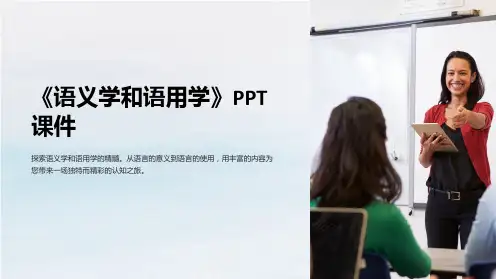
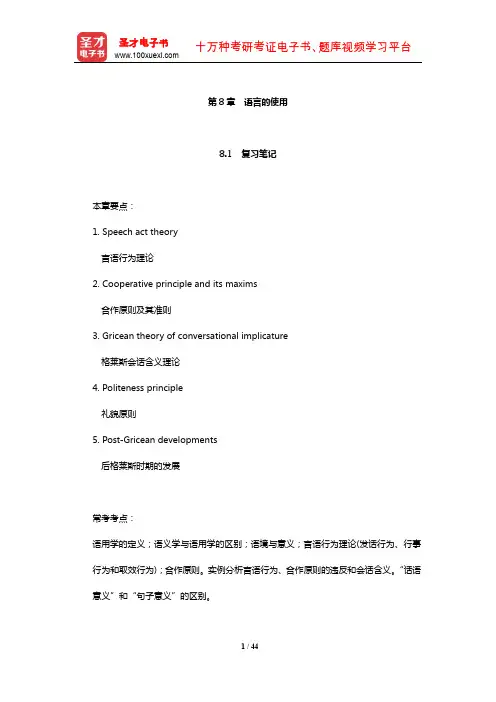
第8章语言的使用8.1 复习笔记本章要点:1. Speech act theory言语行为理论2. Cooperative principle and its maxims合作原则及其准则3. Gricean theory of conversational implicature格莱斯会话含义理论4. Politeness principle礼貌原则5. Post-Gricean developments后格莱斯时期的发展常考考点:语用学的定义;语义学与语用学的区别;语境与意义;言语行为理论(发话行为、行事行为和取效行为);合作原则。
实例分析言语行为、合作原则的违反和会话含义。
“话语意义”和“句子意义”的区别。
本章内容索引:I. Pragmatics1. Definition2. Difference between pragmatics and semantics II. Speech Act Theory1. Performatives and Constatives(1) Definition(2) Felicity Conditions2. A Theory of the Illocutionary Act3. Searle’s Classification of Speech Acts(1) Representatives:(2) Directives(3) Commsives(4) Expressives(5) DeclarationsIII. Cooperative Principle (CP)1. Cooperative Principle and Its Maxims2. Violation of the MaximsIV. Conversational Implicature1. Definition2. Characteristics of Conversational Implicature(1) Calculability.(2) Cancellability(3) Non-detachability(4) Non-conventionality.V. Politeness Principle (PP)VI. Post-Gricean Developments1. Relevance Theory2. The Q- and R-principles3. Levinson’s Q-, I-and M-principles▼4. A socio-cognitive approachI. Pragmatics (语用学)【考点:Pragmatics与Semantics的异同】1. Definition (定义)Pragmatics is the study of language in use, focusing on the study of speaker’s meaning, utterance meaning or contextual meaning.语用学是研究语言实际运用的学科,集中研究说话人意义、话语意义或语境意义。
